You can’t have too much information when it comes to connecting with your team. That’s why we’re answering some of the most common questions we get asked.

At Riff, our goal is to help people be more effective in what they do by providing better insights about everyday activities, especially their interactions and collaborations. We envision a world where remote collaboration and learning is just as natural, strong, and efficient as in-person.
Riff gives real-time and post-meeting feedback about how people interact in video meetings. This feedback has been proven to help teams perform more effectively.
Desktop or laptop computers are fully supported. We also support smartphones and tablets. These devices need to have the following:
An internet connection with a minimum speed of 3 mbps for both upload and download (10 mbps is recommended).
The Meeting Mediator provides live feedback about conversational dominance during the meeting. AI-driven conversation models track turn-taking between speakers in a live Riff Video meeting. When someone is speaking, the line thickens and the center ball moves toward the speaker’s colored dot. Conversely, for individuals who aren’t contributing, their line will look thin and the ball will be farther away from them.
Why is this important? Equal speaking time across all members is associated with better information flow and exchange of ideas, which helps during brainstorming, problem solving, and design review sessions, leading to more creative solutions. Even distribution of speaking in a small group also indicates more trust between group members, leading to better decision making.
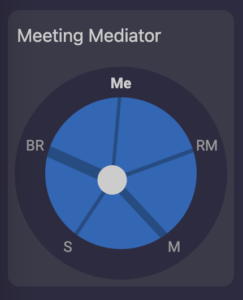
After each meeting, you have access to a personalized Riff Metrics dashboard that provides detail on your group’s communication patterns in the meeting. Is everyone getting fair speaking time? Are your interruptions keeping others from contributing? Is your team balanced, with high engagement? The timeline provides further context for many of these dimensions.
Speaking time shows a breakdown of how long each member of your meeting spoke for. More equal speaking time across all members is associated with higher creativity, more trust between group members, and better brainstorming.
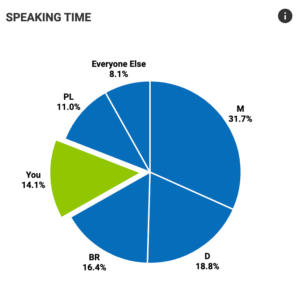
This graph shows the network of conversational “volleys” in your meeting. A volley happens when an attendee responds quickly after someone else speaks, picking up the thread of the conversation. Repeated volleys indicate that a person is consistently engaged by what the speaker said, a sign of influence between those two people.
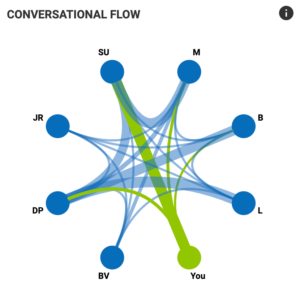
These represent short feedback to the speaker. Typically, they reinforce what the speaker is saying without taking over the conversation (an “affirmation,” indicating engagement with the speaker). Occasionally, these interjections can be negations, indicating disagreement with what is being said, and other times they can be a way to indicate a desire to speak. All interjections are signs of engagement with what the speaker is saying without being disruptive.
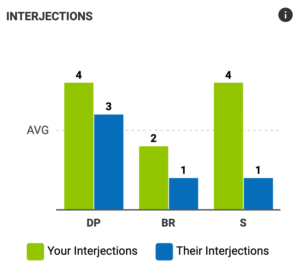
Interruptions are when a person begins talking over the speaker, and takes over the conversation. When interruptions occur in a highly-engaged group and stay on topic, they are likely to be perceived as positive. If they abruptly change the subject, or occur in a slower-paced discussion, they are likely to be perceived as rude or disrespectful.
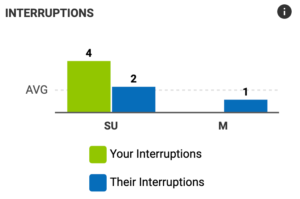
The timeline of when people spoke during a meeting show not only each “utterance” for all the participants, but also all the interruptions, affirmations, and influenced responses that happened throughout the meeting.
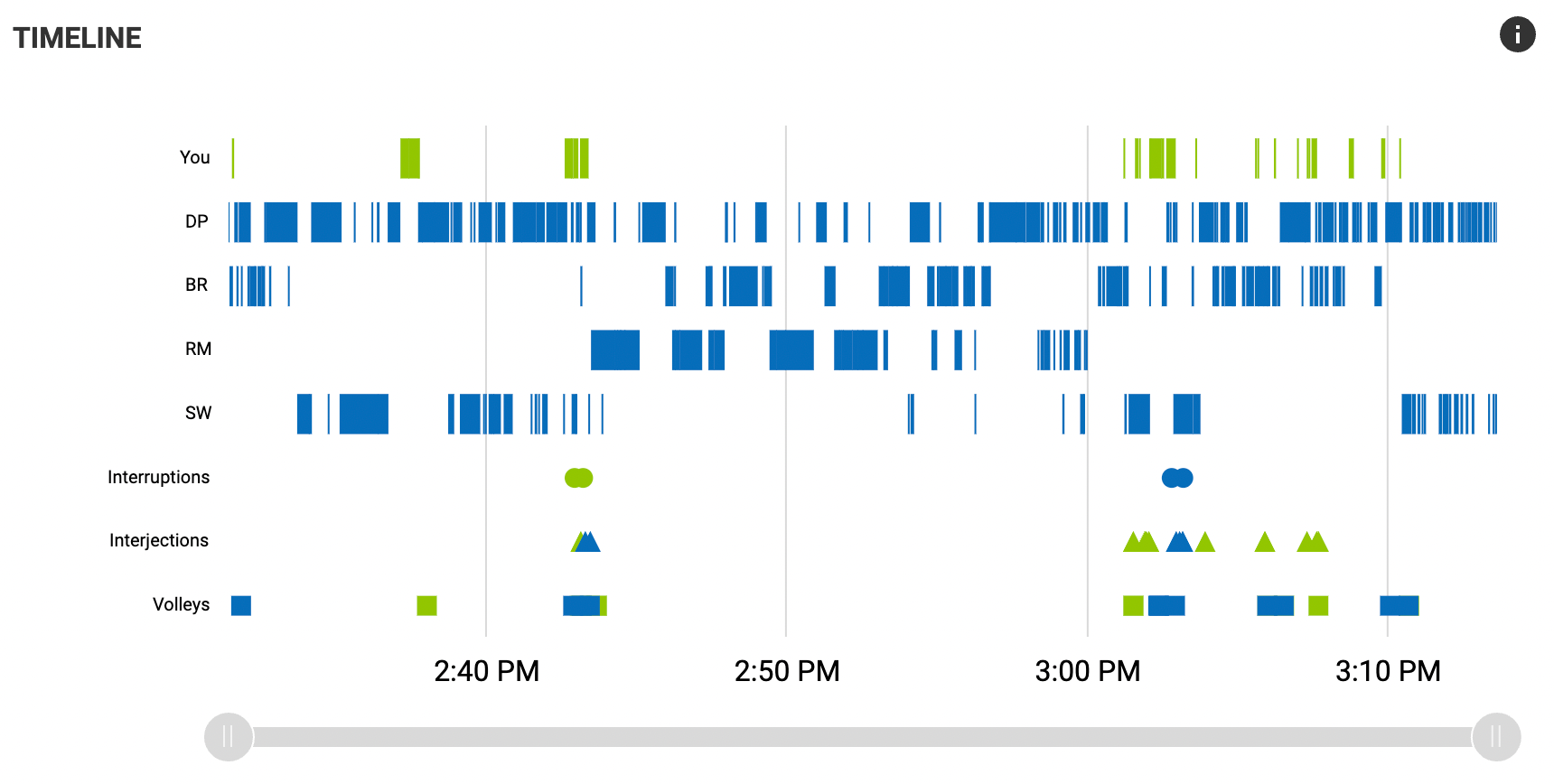
We respect your right to privacy and security for all communications on the Riff Platform. Our default privacy policy is to never gather, store, or sell information about you. This is a core value of Riff and a responsibility we take very seriously.
ANY OTHER DETAILS ABOUT SECURITY?
In learning scenarios where Riff staff are responsible for maintaining a safe and respectful chat environment, content may be monitored, flagged, and removed if it violates the terms of service.
In order for you to use Riff, we do need to gather a few pieces of personally identifying information (“PII”).
If you are connecting to Riff from a learning management system or other application, your device needs to tell us its Internet location (IP address) so that we can connect you with others’ devices (which need to tell us their Internet locations, too). We then create a unique identifier for you on the platform and receive whatever data the other application wants to give us (usually a name or an email address or some other identifier that is specific to that application).
If you are connecting to Riff directly through our Website, we also create a unique identifier for you, so we can show you data about your meetings over time. We do not otherwise track this information and we don’t share it with anyone else. (Anonymous usage is available in trial and beta versions only.)
When you create a password-protected profile on the Riff Platform, you can then provide as little or as much information as you like in the profile form, but you must at least give us your name and your email address. Again, these data are not shared with anyone who doesn’t already know them (you and the other people in your meetings).
We collect anonymous usage data (with no personally identifying information attached) to improve the Riff Platform services and WebRTC technologies in general. Examples of usage data may include information about your browser, operating system, platform, the percentage of time spent talking or using text chat, how and when certain features are used (e.g., muting and unmuting audio), and the occurrences of connectivity failures. At times we provide some of this data to the Google Chrome and Mozilla Firefox teams so that they can prioritize and fix bugs in their code.
We collect personalized usage data on your behalf in order to produce analytically derived insights about you — how much you spoke, interruptions and affirmations, turn-taking in your meetings with others, your network of chat-based connections, and other metrics derived from the textual, vocal, and facial-gestural data streams. Your usage data is aggregated with data from other users to develop and refine the behavioral models that we use to deliver the visualizations and metrics you see during a meeting and immediately after a meeting has occurred.
At no time do we share that data — in its non-anonymized form — with anyone other than you and, as appropriate, the other people who were in a meeting or text-based exchange with you.
Learn more about Riff’s transformational power
in a one-on-one demo.